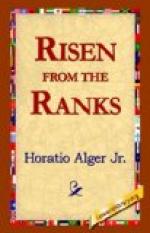“You will be glad to hear that we are all well. I have sold the cow which I bought of Squire Green, and got another in her place that proves to be much better. We all send much love, and your mother wishes me to say that she misses you very much, as indeed we all do. But we know that you are better off in Centreville than you would be at home, and that helps to make us contented. Don’t forget to write every week.
“Your affectionate father,
“Hiram Walton.
“P. S.—If you print any more articles, we shall be interested to read them.”
Harry read this letter with eager interest. He felt glad that his father was pleased with him, and it stimulated him to increased exertions.
“Poor father!” he said to himself. “He has led a hard life, cultivating that rocky little farm. It has been hard work and poor pay with him. I hope there is something better in store for him. If I ever get rich, or even well off, I will take care that he has an easier time.”
After the next issue of the “Gazette” had appeared, Harry informed Ferguson in confidence that he was the author of the article on Ambition.
“I congratulate you, Harry,” said his friend. “It is an excellent essay, well thought out, and well expressed. I don’t wonder, now you tell me of it. It sounds like you. Without knowing the authorship, I asked Clapp his opinion of it.”
“What did he say?”
“Are you sure it won’t hurt your feelings?”
“It may; but I shall get over it. Go ahead.”
“He said it was rubbish.”
Harry laughed.
“He would be confirmed in his decision, if he knew that I wrote it,” he said.
“No doubt. But don’t let that discourage you. Keep on writing by all means, and you’ll become an editor in time.”
CHAPTER XVI.
Ferdinand B. Kensington.
It has already been mentioned that John Clapp and Luke Harrison were intimate. Though their occupations differed, one being a printer and the other a shoemaker, they had similar tastes, and took similar views of life. Both were discontented with the lot which Fortune had assigned them. To work at the case, or the shoe-bench, seemed equally irksome, and they often lamented to each other the hard necessity which compelled them to it. Suppose we listen to their conversation, as they walked up the village street, one evening about this time, smoking cigars.
“I say, Luke,” said John Clapp, “I’ve got tired of this kind of life. Here I’ve been in the office a year, and I’m not a cent richer than when I entered it, besides working like a dog all the while.”
“Just my case,” said Luke. “I’ve been shoe-makin’ ever since I was fourteen, and I’ll be blest if I can show five dollars, to save my life.”
“What’s worse,” said Clapp, “there isn’t any prospect of anything better in my case. What’s a feller to do on fifteen dollars a week?”




